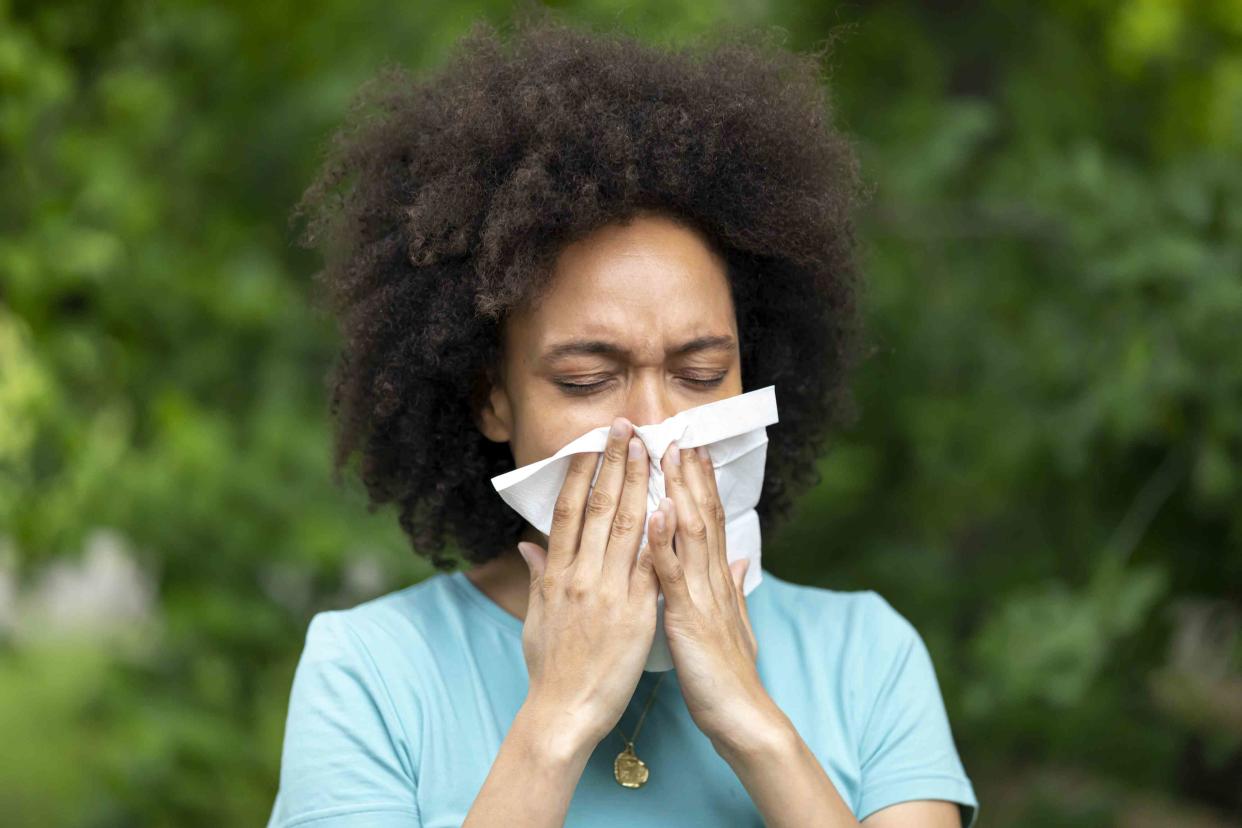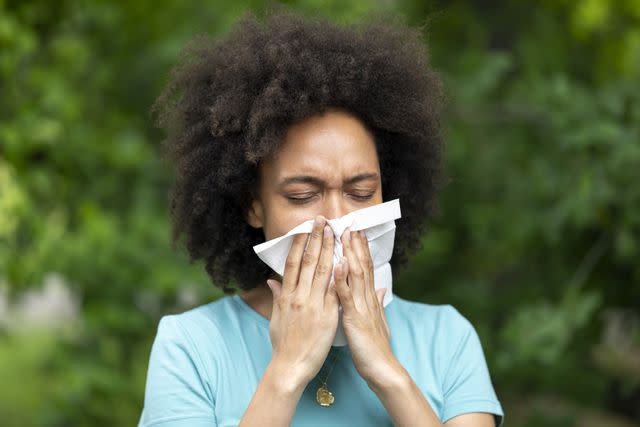Does Your Heart Stop When You Sneeze?

ProfessionalStudioImages / Getty Images
Medically reviewed by Renee Nilan, MD
If you're wondering if your heart stops when you sneeze, you will be pleased to know the answer is no. The idea that you die when you sneeze is a myth. You sneeze because your body is trying to eliminate an allergen, germs, or another irritant.
This article discusses what happens to your heart when you sneeze or have hiccups, what happens in your body when you sneeze, and whether there are any benefits.

ProfessionalStudioImages / Getty Images
What Happens to the Heart When You Sneeze?
It may feel as if your heart stops when you sneeze. However, that sensation is the pressure in your chest rising as your body needs to sneeze.
Right before you sneeze, you inhale, which builds chest pressure. As you sneeze, the body exhales, and the chest pressure decreases. Although the change in chest pressure may briefly affect your heart rhythm, your heart doesn't stop beating at that time.
Your heart rhythm varies naturally throughout the day based on your physical activity, medications, and hydration levels, among other reasons. When your heart rhythm is outside its usual pattern, it's called a heart arrhythmia.
Arrhythmia is caused by problems in your heart's electrical system. An arrhythmia can occur due to a change in your heart rate or your typical heartbeat pattern. Symptoms of arrhythmia include:
Chest pain
Dizziness or light-headedness
Fainting
What Is Sneeze Syncope?
"Syncope" is the medical term for fainting. Sneeze syncope is a rare phenomenon that refers to fainting when you sneeze.
One published research report on sneeze syncope notes an incident involving an older woman with glaucoma who fainted when sneezing due to an atrioventricular block. This is a heart rhythm disorder characterized by an abnormally slow heartbeat. The woman was using beta-blocker eye drops, which treat high blood pressure and can cause side effects like a slowed heart rate. Her sneeze syncope resolved when she stopped using the drops.
In another report, a 50-year-old man with intense sneezing experienced dizziness and trouble walking. He also had temporary weakness and an inability to move one side of his body after sneezing. Medical providers realized that he had a noncancerous tumor on his aorta, the artery that carries blood away from the heart to the rest of the body. Once the tumor was removed, the intense sneezing episodes stopped.
If you have unusual symptoms associated with sneezing, talk to a healthcare provider to help determine if additional evaluation is necessary.
What About Hiccups?
Hiccups can be annoying, but like sneezing, your heart doesn't stop when you have hiccups. They occur due to a spasm of the diaphragm or the nerves controlling the diaphragm, creating a burst of air. The air hitting your vocal cords causes the "hiccup" sound.
Some common causes of hiccups include:
Having carbonated drinks
Feeling excited or nervous
Swallowing air from chewing on gum or candy
A change in temperature
In rare cases, hiccups have more severe causes, such as:
However, these more serious causes are associated with longer-term hiccups vs. hiccups that come and go quickly. Talk to a healthcare provider about your hiccups if you've had them for a few days or longer.
If you have hiccups with other heart-related symptoms like chest pain, call 911 or go to an emergency room.
Everything That Happens During a Sneeze
The following occurs when you sneeze:
Your nerve endings cause a tickling sensation.
The nerves let your brain know there's an irritation in your nose that it wants to eliminate.
You naturally inhale and very briefly hold your breath. This makes your chest tighten.
The pressure in your lungs rises.
You instinctively close your eyes.
Your tongue presses against the top of the mouth.
Breath comes out quickly through your nose, causing a sneeze.
Triggers that can cause you to sneeze include:
A cold, flu, or COVID-19
The use of nasal sprays like inhaled corticosteroids
Withdrawal from drugs
Miscellaneous triggers, such as perfumes, spicy foods, and air pollution
Related:Can You Sneeze While You Sleep?
Are There Any Benefits of Sneezing?
If you have that familiar feeling of a sneeze starting, it's best to let it out. Sneezing helps the body by:
Clearing your sinus passages
Getting rid of allergens or other irritations
Helping the body eliminate bacteria and viruses that could spread to your ears, causing an infection
To avoid spreading germs, remember to sneeze into a tissue and not directly on other people or in their vicinity. If you don't have a tissue available, sneeze into your elbow.
Summary
Your heart does not stop when you sneeze. However, your heart rhythm may briefly change. When sneezing, your nerves send a signal to your brain to get rid of nasal irritation. The pressure in your chest increases and then decreases during a sneeze. Sneezing has several benefits, like clearing your sinuses and getting rid of bacteria and viruses.

